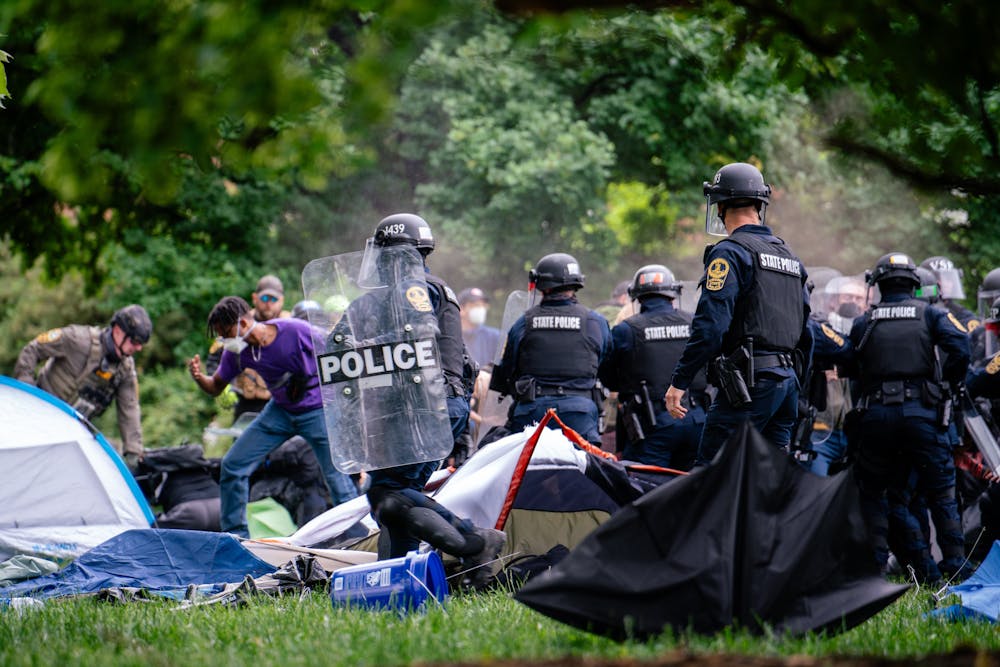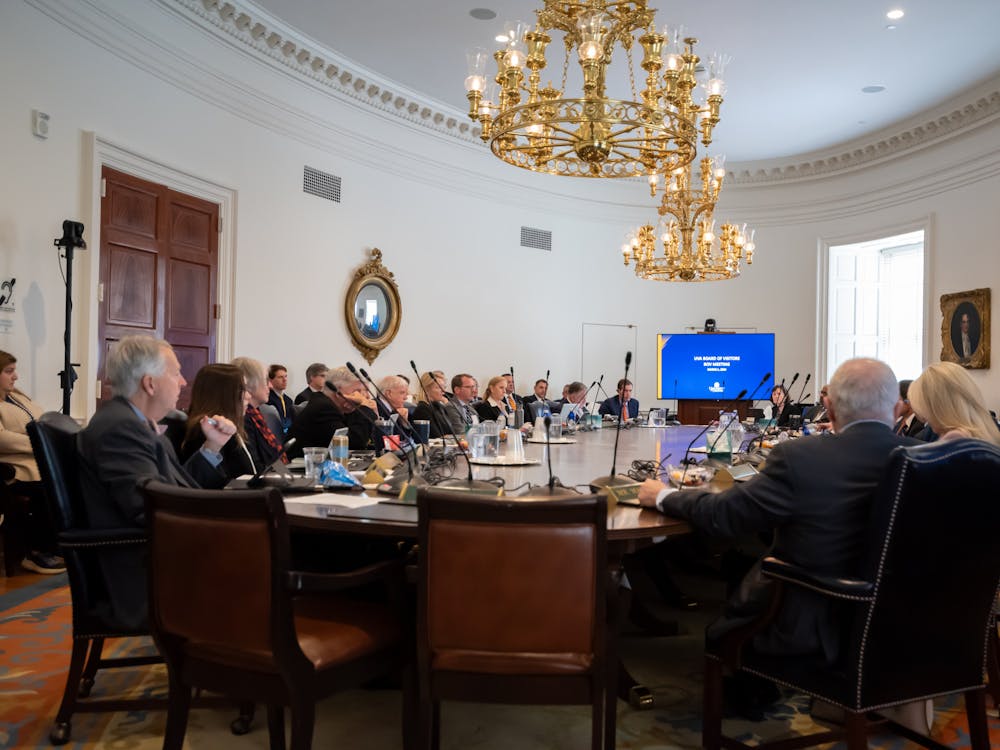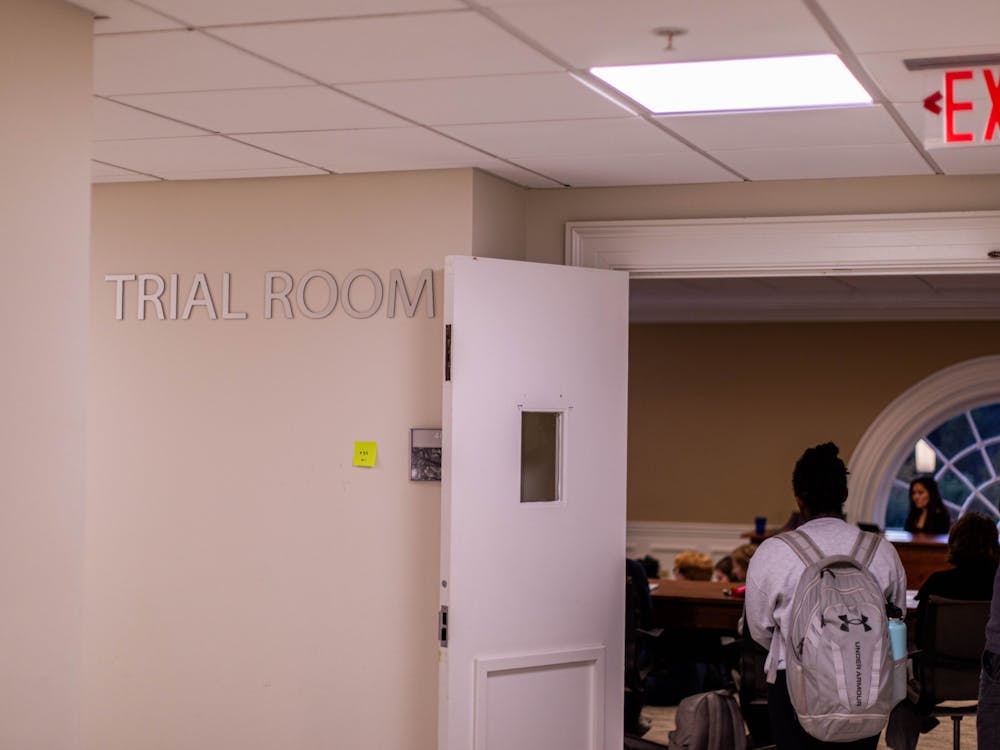In the days after police forcibly cleared a pro-Palestine encampment near the University Chapel, a last-minute edit to a list of guidelines — from the Office of Environmental Health and Safety — related to the use of tents on Grounds has been the subject of questions and debate. According to University administrators, a document on the office’s website outlining fire safety regulations for tents contained an inaccurate clause that exempted recreational tents from permit requirements. University officials said the document was updated for accuracy, as official University policy requires all tents to receive permits prior to their use on Grounds. Administrators said the encampment violated this policy.
Protesters first formed the encampment, known as the “Liberated Zone 4 Gaza,” April 30. The demonstrators within the encampment called on the University of Virginia Investment Management Company, which manages the University’s investment portfolio, to disclose all investments and “no longer invest its endowment in institutions materially supporting or profiting from Israel’s genocide, apartheid and occupation of Palestine,” among other demands. While protesters largely complied with University policy regarding tents between April 30 and early May 3, some protesters began erecting tents ahead of incoming rain on the night before the encampment was forcefully cleared.
Before 9:54 a.m. Saturday, May 4, a document on the University’s Office of Environmental Health and Safety website stated that while tents and other similar air-supported infrastructure must be checked by University Fire Safety personnel before usage, only air-supported structures greater than 400 square feet require a permit to remain on University property. An italicized line in the document also stated that recreational tents for camping were exempt from the requirement to receive permits.
However, during a virtual town hall meeting Tuesday, University President Jim Ryan said that official University policy already required permits for all tents even prior to the document change, making the exemption in the document from the Office of Environmental Health and Safety inaccurate. The town hall was held over Zoom, where Ryan and other University administrators selected questions from the audience regarding the logistics, decision-making process and aftermath of the event.
A University official deleted the exemption clause from the Office of Environmental Health and Safety’s document just a few hours before police detained and arrested 27 community members at the encampment. Ryan said the edit was a potentially misguided effort to ensure the document accurately represented the University’s rules.
“Someone on our team — and I'm not sure this was the right judgment — at 9:30 [a.m.] or so on Saturday decided to remove that [sentence from the document] so that those rules were consistent with policy,” Ryan said.
Deputy University Spokesperson Bethanie Glover said that while the document found on the University website by protestors had not been updated accurately until Saturday morning, the two University policies regarding tent usage, SEC-013 and SEC-030, have not actually changed since 2023. According to Glover, University policies are reviewed regularly and put in place to ensure the safety of University community members.
According to History Prof. Indrani Chatterjee, despite the regular review of these policies, the inaccuracy on the Office of Environmental Health and Safety’s website has raised concerns about the University administration’s efficiency.
“When regulations like this are changed or sites are not updated, it shows great inefficiency on the part of the administration,” Chatterjee said.
At the town hall, Ryan said that he did not believe there was confusion among protesters about the permissibility of tents due to warnings from University officials on several occasions to remove tents, including Timothy Longo, chief of the University Police Department and associate vice president for safety and security.
“I don’t think anyone involved thought that tents were allowed, because they’re not, and that was not the claim,” Ryan said. “I think that protesters knew that the tents weren’t allowed and wanted to keep them up anyway.”
Some students and faculty have criticized the University’s response to the encampment as disproportionately forceful, regardless of whether or not tents violated University policy. In a statement signed by more than 40 faculty members as of the time of this article’s publication, professors in the Department of History said that the use of police to clear the encampment violated the University’s commitment to free inquiry and expression.
“The drastic move to end a peaceful protest with militarized police, rather than reason, put a swift end to any form of deliberation, debate, and democratic process,” the letter reads. “It violated our commitment as an educational institution to seek understanding and discourage mindless compliance.”
Chatterjee was also one of several faculty liaisons present at the encampment and communicated with University administrators to promote deescalation and try to help reach a peaceful resolution between protestors and the University. She said as part of the liaisons’ goal to keep the protest peaceful while protecting students, they asked Longo to let students keep tents up while it rained the night of May 3.
“Our faculty pleaded with [Longo] to let the students sleep safely,” Chatterjee said. “They're sheltering, they're not harming anybody, they're not making noise. They had been completely nonviolent … so I didn't see any harm in their trying to sleep at night safely.”
According to Chatterjee, no students used tents in the encampment until the night of May 3. Chatterjee said that the University should have treated the protestors with more kindness in response to tents being set up rather than ordering them to take them down.
“You have to be compassionate towards kids who have slept in the open for four days,” Chatterjee said. “If you are that hard-hearted, you have no place in an educational institution.”
Some community members have also raised concerns about the tent policy being used as a method of censoring a particular viewpoint. A faculty liaison showed University officials photos of a recreational tent that was erected on Grounds by a group of volleyball players and questioned why administrators were not taking action to remove it. Glover said the University took action to remove the tent once they were made aware of the issue.
“Any time the University is made aware of a violation of policy, we work to ensure that policies are communicated and complied with by the parties in question,” Glover said. “That was the case over the weekend of May 4. Once we learned of unapproved tents and canopies that had been erected separately from the demonstration, we asked that they be taken down to comply with University policy.”





